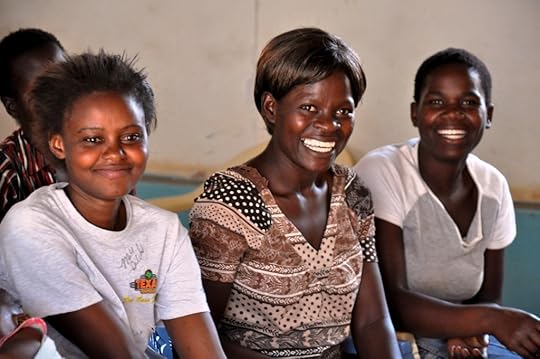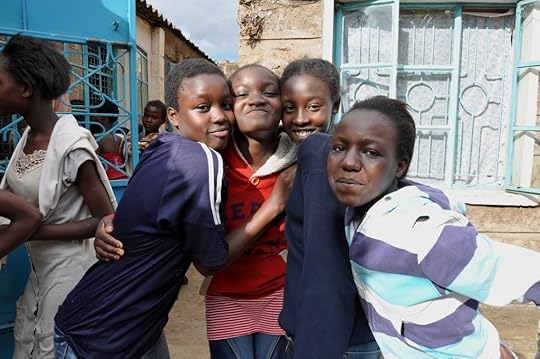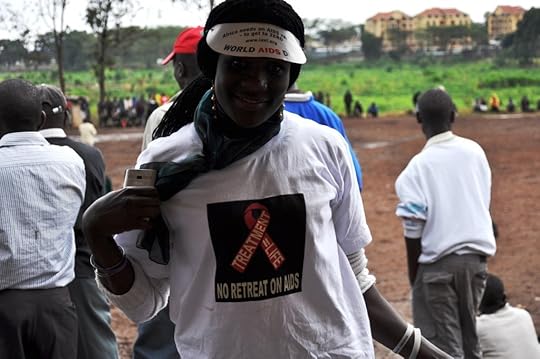Rye Barcott's Blog, page 19
March 31, 2014
Thinking Big: Richard’s Story
It’s hard to believe that Richard, a CFK alumnus, could be any busier. In addition to holding a job as a consultant and event planner, Richard is in his last year as a full-time university student studying economics and development, he is the co-founder and co-leader of the Langata Youth Network, and he mentors new volunteers in CFK’s Sexual and Reproductive Health Program (SRH). He does all this while living in Kibera, a place marked by desperate poverty yet bursting with potential. How did he find the motivation?
![Richard [slide size]](https://i.gr-assets.com/images/S/compressed.photo.goodreads.com/hostedimages/1396361584i/9122389._SY540_.jpg)
“It’s through volunteering that I got opportunities,” said Richard. “CFK taught me the skills I needed to be successful and helped me grow my network. I want others to have that chance.”
His answer: from mentors at CFK, like CFK Executive Director, Hillary Omala; SRH Program Officer, Cathrine Wagude; and SRH Program Officer, Ben Haggai (who is currently on sabbatical in Boston working for Global Health Corps). Recalling Ben’s advice, Richard said, “He used to tell us, ‘I don’t reward failure.’ He was tough, so we had to learn and we’re better because of it.”
Richard is certainly tough as well—and driven because of it. Born and raised in Kenya’s Nyanza Province in western Kenya, Richard was the youngest of eight children. Throughout his childhood, he struggled to get through school because his family was unable to afford his school fees. Even though he was accepted into one of the top high schools in Kenya, he instead went to a lower-quality public school that was much more affordable.
“There weren’t a lot of teachers,” he said, recalling his high school experience. “One teacher would teach 3 or 4 subjects, but if they took time off for extra studies or to go on maternity leave, we would have to wait—sometimes months—until they returned to continue with our lessons.”
After successfully finishing high school, university was financially out of reach for Richard so he began looking for work. Eventually this search took him to Nairobi, a move that many young Kenyans living in rural areas make, often for similar reasons. With extended family in different parts of Nairobi, Richard tried out each area and eventually decided to live in Kibera with his uncle due to its proximity to downtown Nairobi, where most job opportunities are located.
In 2009, Richard saw an ad that said Carolina for Kibera was looking for volunteers to support their Sexual and Reproductive Health program. He applied and was accepted as a Youth Peer Provider (YPP). As a YPP, Richard was taught about sexual and reproductive health, how to facilitate meetings, how to mobilize the community to engage and talk about health, and how to network in order to get things done. After finishing his two-year engagement, Richard moved into a different role as a YPP volunteer mentor, a position he still holds today. His involvement with CFK also led him to apply for and earn a partial scholarship to help him offset the costs of university.
Richard credits Kibera with giving him access to a vast network that could help his own professional development. “People should really know and appreciate the networking potential in Kibera for youth.” Using skills he learned from his time at CFK, Richard was able to leverage that network, and he began thinking about how to create opportunities for himself.
The culmination of his efforts became the Langata Youth Network (LYN), which he co-founded in 2012 with three of his peers. LYN works to educate communities on a variety of issues, such as hygiene and sanitation, education, health, and various sensitive political issues that can evoke intolerance and violence. Richard serves as the secretary-general of the organization. Working across Nairobi with other small partner organizations and with USAID’s Yes Youth Can program, LYN provides community mobilization expertise for the development of programs and services regarding those issues. Though it has started small, Richard has lofty ambitions for the future of LYN—and he credits CFK for encouraging him to think big.
“I appreciate CFK for giving me the opportunity to serve the community of Kibera in different capacities. You can’t actually be president of anything if you can’t start from small things. It’s through volunteering that I got opportunities. I didn’t know I could go to university, have so many contacts, travel to Uganda. We need to not sit back but be impassioned and take initiatives to the next level and not always look for white-collar jobs, but rather to start small. I want Langata Youth Network to grow and create a huge impact on people’s lives. I want to provide scholarships for school, because I know how hard it is. I want to link youth with organizations who can help with employment opportunities like CFK. CFK taught me the skills I needed to be successful and helped me grow my network. I want others to have that chance. It’s through our own determination that we can change our lives.”
March 24, 2014
Teaching Healthy Habits to Young Girls
By: Suzanne Thomson, CFK Organizational Consultant
–
They filed into the Tabitha Medical Clinic, one by one. Quiet and shy, they crammed close to one another on the benches of the reception area and spoke softly to one another. An elegant Kenyan woman appeared with a bright smile for all the girls. “Good morning,” she said, clapping her hands together. “My name is Macrine. I’m a nurse here at the Tabitha Clinic and I love myself. Let’s hear who you are,” she said, pointing to the girls to introduce themselves.
One by one, they stood and told the room their name, grade, and what they loved: themselves, their country, their families, their height, their school, recent Academy Award winner Lupita N’yongo (who is Kenyan), dancing, poems, everyone else in the room, their color, their tribe, soccer, smiling, music, the way they are. When the introductions were over, Macrine clapped her hands together and said, “This is good that we love ourselves and each other, and we have to remember to take care of ourselves and our bodies.”
Organized by CFK’s Daughters United (Binti Pamoja) program, around 40 young girls spent the day at the Tabitha Medical Clinic with Macrine to talk about health issues that affect them and to ask any questions they have about their health while in a safe environment. Topics ranged from ways young girls in Kenya should take care of themselves, the importance of taking preventative measures if engaging in sex, and the importance of being screened for cervical and breast cancer.
When the topic of breast cancer came up, one of the girls raised her hand. “What causes breast cancer?” she asked. Macrine turned the question to the group and asked what they had heard were the causes. Another girl raised her hand, “When you sleep on your stomach for too long, the breast doesn’t get enough blood and the result can be cancer.” A few others shared what they had heard about the disease before Macrine gave them new—and correct—information.
In Kibera, there’s an astounding amount of misinformation about important health issues like cancer, HIV/AIDS, STIs, and other medical conditions. Hearing dangerous myths leads to real-life consequences for young girls. Regular, open health discussions like these help dispel incorrect information and stigma surrounding these health issues.
March 6, 2014
It Takes a Village
By: Suzanne Thomson, CFK Organizational Consultant
–
One of the differences I’ve seen between Kenyans and Americans is how comfortable many Kenyans are around children, even newborns. Maybe it’s the communal upbringing culture or that people are just around more small children growing up than Americans, but I always get a kick out of it when I see it, particularly with men when they are working.
On several occasions, crammed in a matatu, I’ve watched seemingly tough-looking conductors help mothers and their young children in and out of the vehicles, talking to the kids like they are brothers or sisters. I’ve seen taxi drivers having long conversations with street boys about their homes or schools. And at Carolina for Kibera’s Nutrition Centre, I’ve watched the security guard, in his military-like uniform play with one-year-olds, hold them, talk to them, and correct them when they are acting up. There’s a funny disconnect between the actions and this uniform, which looks formal and is supposed to intimidate.
From the security guard and cooks to the nutritionist and data clerk, everyone at the CFK’s Nutrition Center cares for the children who are enrolled there like their own children. I continued to notice this as the staff held a training session for the parents on strategies and methods for ensuring proper sanitation and hygiene at home.
I realize this must sound like a basic thing regarding cleaning and washing hands, but imagine living in a small room with multiple people without running water, where everyone’s toilet ends up being, pretty much, in the stream next to your house or all over the path you walk everyday. Now imagine trying to keep everything germ-free, with people in and out of the house all day, your child crawling along the path outside and cooking/cleaning with the questionable drinking water you’ve collected down the way. It’s trickier than you think and hugely important in keeping children healthy.
While the mothers and the staff talked through ways to make sure their water is safe and their homes are clean, I split my time between listening to the discussion, watching the mothers with their children, and watching the staff with the children. The mothers ranged from young women, maybe in their early to mid-twenties, to older women who could’ve been any age from 35 to 45. Their small children crawled or ran around together between the mothers. At times, I confused which child went with which mother, as all the mothers would interact with all the children.
The staff would occasionally scoop up a baby, kissing them on the cheek before putting them back down to scamper away. The really bold babies would venture outside where the security guard, whom I’ve described before, would keep an eye on them and steer any escapees back into the building. And in the midst of all this activity, the mothers were able to learn valuable lessons on how to protect their children against diarrhea and other illnesses that could seriously affect their development and future health.
A few days later I was out in the community with the nutritionist doing home visits to check in on children who had been released from the Nutrition Centre. It was like she was an auntie stopping by to see her nieces and nephews. These were all her kids. The over-used line, “It takes a village to raise a child,” is definitely true in Kibera. Not everyone will be a good “parent,” but those that can, will. It’s not just you and your partner anymore, but it’s your family, your partner’s family, your neighbors, your friends, your church, other parents in your situation, and others whom you meet along the way…like the staff at the Nutrition Center, from the nutritionist and the cooks to the security guards.
Sarah’s Journey to Affordable Education
By: Suzanne Thomson, CFK Organizational Consultant
–
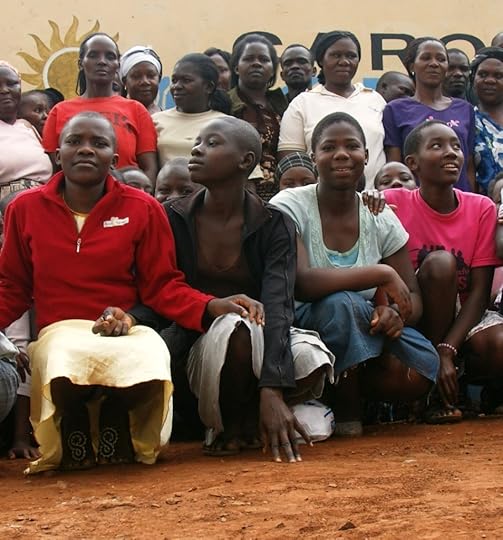
Sarah (3rd from left) poses with her peers who also received CFK scholarships.
Another school year in Kenya has started, and students moving from elementary to high school just began the first term at their new schools. Going to a new school is always difficult—meeting new friends, learning where to go, and how to get there. In the U.S., a student may transition to a new school only once or twice, and it’s more or less a straightforward process. In Kenya, however, it’s a lot more common and less stable, especially for families living in poverty.
This lack of stability was a reality for Sarah, who had to change schools almost every year due to her family’s situation—not because she was switching to high school. From 1st to 8th grade, Sarah attended five different schools, constantly moving after being forced out of school because her family couldn’t pay the expensive school fees. After her parents died when she was only three years old, Sarah began living with her uncle, a laborer whose income is based on what work he can find from day to day. Though the government subsidizes elementary school tuition, parents, guardians, or students themselves have to come up with money for uniforms, books, afterschool activities, and other costs. Because of her family’s financial situation, Sarah’s school fees were often too high.
Despite having to change schools so many times, Sarah studied hard and earned a very impressive score on her National Elementary School exam, an exam that determines what high schools Kenyan students are eligible to attend. The average score for all Kenyans is around 290-300 out of a total of 500; this average is even lower for students living in poverty (around 200-250). Yet, Sarah scored 365, much higher than the average! Since school placements are typically merit-based, her score qualifies her for a place in a good high school.
Unfortunately, high school also isn’t free in Kenya. While the government has taken steps to try and subsidize higher levels of education as well, subsidies still remain far from reach for many students. Additionally, fees vary widely depending on the school, from 10,000 shillings a year (~$118) for a sub-standard, low quality day school, to 1 mil shillings a year (~$12,000) for a high-quality, internationally recognized boarding school. As such, students like Sarah who live in poverty aren’t able to afford any of these options.
That’s where CFK comes in. Through Carolina for Kibera’s Education Program, dedicated students who want to keep attending school but cannot pay for it can apply for scholarships that will give them the opportunity to keep learning at no cost to them. CFK’s program originally provided partial scholarships to prospective students—now, it covers the full cost of attending school for a year.
When Sarah heard of this opportunity, she immediately applied. Because of her hard work and determination, CFK proudly awarded her a scholarship to cover her high school fees! Sarah has begun attending St. Francis Rangala Girls School, a quality mid-level public boarding school in Western Kenya, costing 67,000 shillings a year (~$800). Now this bright girl who struggled so much and fought hard to make it through elementary school will have the opportunity to focus solely on her studies and her life after high school—and she won’t have to worry about making enough to keep learning.
February 24, 2014
Shoes and Nutrition: The Invisible Link
By: Elizabeth Masibo, CFK Health Intern, and Ben Haggai, Community Health Program Officer (currently on sabbatical)
–
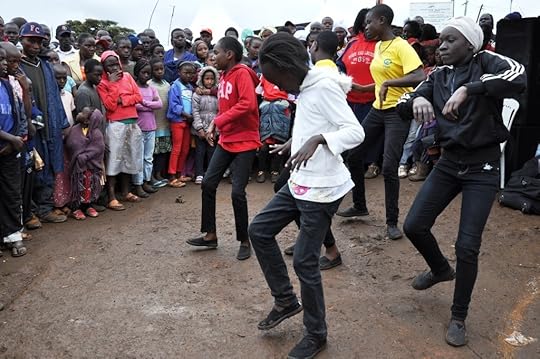
Participants in CFK’s Daughters United program wear TOMS at a local community event.
The ancient Chinese philosopher, Lao Tzu, once stated, “A journey of a thousand miles begins with a single step.” On a sunny Monday in April 2013, TOMS® Shoes generously donated footwear to 400 Kiberan children, giving each of them a new pair of shoes with which to begin their journey.
TOMS is a for-profit company based in Santa Monica, California, which designs and sells shoes on what they describe as a “One for One® Model.” When TOMS sells a pair of shoes, a pair of shoes is given to an impoverished child. CFK partnered with TOMS in Kibera to provide a simple way for children to stay healthy and safe.
There is a definite—and often overlooked—relation between a child’s foot and his or her well-being. So it was no coincidence that Lishe Bora Mtaani, CFK’s brand new nutrition centre, was chosen as the distribution point for the donated shoes. The centre’s goal is to boost the health of Kiberan children who have become all too acquainted with malnutrition. Often, nutritional deficits can actually be tied to a child’s lack of basic footwear. Numerous Kiberan children play wearing flip-flops or no shoes at all. Those lucky enough to own a pair of shoes have often severely worn them out. As a result, their feet are left susceptible to rusted metal, burst sewers, and parasitic worms. All of these hazards among others can lead to effects like infections, anemia, and other long-lasting health conditions. Having sturdy footwear goes far beyond basic comfort—it can actually determine the long-term health of the wearer.
Even before its official opening, the nutrition centre had already begun to extend health services to children of Kibera. With a start-up number of 100 malnourished children, the nutrition centre has made incredible strides to help boys and girls stay in school and improve their health. Preliminary activities like the shoe distribution offer a great opportunity for parents and children to get acquainted with the centre and its staff. The combination of new shoes and access to nutritional services better equips these children for their journeys.
February 6, 2014
Beyond the Loan: Marketing Workshops to Maximize Profits
![Biz Training 3 [re-size]](https://i.gr-assets.com/images/S/compressed.photo.goodreads.com/hostedimages/1391786869i/8456754._SX540_.jpg) For just over a year and a half, CFK has been partnering with Kiva Zip, an initiative started by Kiva.org that provides direct, peer-to-peer microloans to people hoping to expand their business. Rather than giving people loans directly, CFK serves as a trustee, recommending business owners to Kiva who then lists them as candidates for loans. Over that year and a half, CFK has endorsed 39 microloans with almost all of them being repaid in full. (Check out our profile on Kiva Zip to learn more about CFK-endorsed small business owners.) These microloans have helped several small businesses across Kibera find their footing as they begin to grow.
For just over a year and a half, CFK has been partnering with Kiva Zip, an initiative started by Kiva.org that provides direct, peer-to-peer microloans to people hoping to expand their business. Rather than giving people loans directly, CFK serves as a trustee, recommending business owners to Kiva who then lists them as candidates for loans. Over that year and a half, CFK has endorsed 39 microloans with almost all of them being repaid in full. (Check out our profile on Kiva Zip to learn more about CFK-endorsed small business owners.) These microloans have helped several small businesses across Kibera find their footing as they begin to grow.
But what happens after a loan is repaid? A temporary increase in capital on its own does not guarantee long-term success. Many small business owners who have received small loans from Kiva Zip still struggle to maintain a steady income.
Enter CFK’s Economic and Entrepreneurship Department (EED), which holds business and marketing trainings for aspiring entrepreneurs. In addition to vouching for business owners who desire loans from Kiva, the EED also helps people maximize their profits by teaching them about strategies to achieve their goals.
Betty, who runs two businesses in nearby Toi Market selling second-hand children’s clothes, had been hearing about these business trainings from friends and colleagues in the area. When she heard CFK was the organization behind the trainings, she grew very excited to attend. Betty proudly states that her household was one of the first to pay for garbage pick-up from Taka ni Pato, CFK’s trash collection program. She also received a loan from Kiva Zip through her involvement with CFK.
At the training, where about 35 small business owners gathered together, the facilitator emphasized that simply having more stock is not enough. Even if you have stock to sell, customers won’t necessarily come to shop at your business. Rather, one must know their customers, where they are located, and how to communicate with them. Through group discussions, the facilitator helped attendees to think differently about their businesses, talking through strategies and promotions to draw in and keep customers.
![Biz Training 2 [re-size]](https://i.gr-assets.com/images/S/compressed.photo.goodreads.com/hostedimages/1391786869i/8456755._SX540_.jpg) “I’ve never thought of it that way,” Betty admitted about the discussion. “It really caught me. After [the workshop] I went to my old diaries to look up former customers and started to text them. This past Saturday, one of them showed up. I hadn’t seen her for two years.”
“I’ve never thought of it that way,” Betty admitted about the discussion. “It really caught me. After [the workshop] I went to my old diaries to look up former customers and started to text them. This past Saturday, one of them showed up. I hadn’t seen her for two years.”
Talking excitedly about how the lesson was still on her mind a week after the workshop, Betty said she now understands the importance of maintaining a good customer base by knowing her clientele and anticipating their needs. With these newfound strategies, small business owners such as Betty can begin to maximize on their loans and truly transform their businesses.
Reaching Out Across Kibera: Community Forums for Daughters United
There is an undeniable sense of community in Kibera. The networks of family and friends to which people turn to for support are extensive. And though this sense of community is pervasive, girls in Kibera often find themselves without a safe, understanding environment where they can talk about their problems. Challenges like lack of women’s rights, sexual violence, HIV, lack of educational opportunities, early marriage, and others are routinely ignored, misunderstood, or discouraged from conversation.
CFK’s Daughters United program (Binti Pamoja in Swahili) works to remedy that by providing girls with spaces (both physical and emotional) in which to bring these issues to light. One of the elements that makes Daughters United so effective in reaching young girls is its ability to nurture the leadership qualities of adolescent girls. When girls join the program, not only are they taught about confidence, reproductive health, life skills, creative arts and financial literacy, but they are mentored and trained on how to organize and facilitate their own girls’ groups.
Additionally, Daughters United holds community forums for its participants throughout the year. At these forums, girls invite their friends from all over Kibera who aren’t in the program in order to inform them about everything that Daughters United does. It’s a perfect place for the girls to practice their facilitation skills and educate guests on topics that are important to them. Similar to other Daughters United events, the girls engage in several types of art activities, including dancing, theatre, and displays of artwork or photography.
Though the community forums are regular events, attendance is always high. The last forum included over 175 guests! By inviting their friends to these forums, girls in the program are able to show off their talents and demonstrate to people why having a community and a space to call their own is so important. Take a look at some pictures from the most recent forum below! 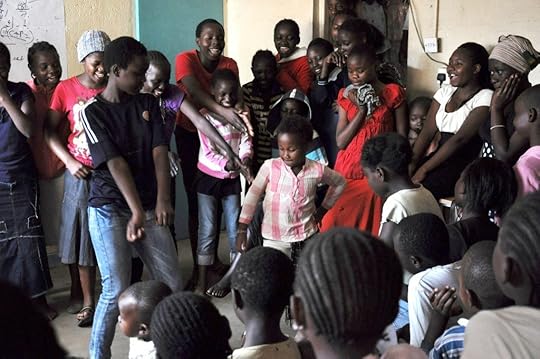
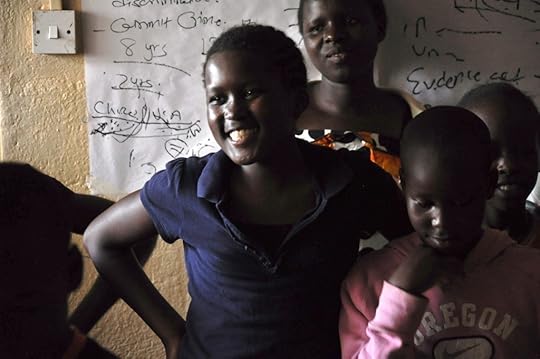

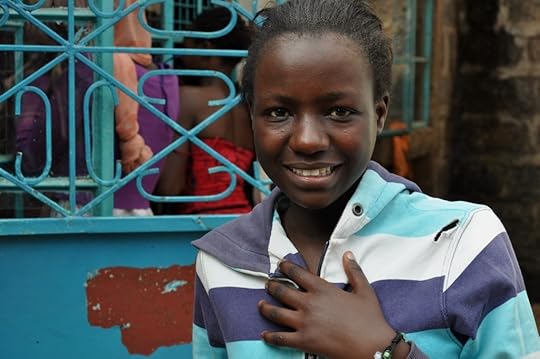
January 30, 2014
Congratulations to the CFK Sprinters!
This past December, Carolina for Kibera served proudly as the co-host of partner organization One World One Rope’s 4th Annual East Africa Jump Rope Competition & Camp. (You may remember in July of last year that some of the members of the CFK Sprinters, CFK’s very own jump rope team, got the opportunity to travel to the U.S. to compete in One World One Rope’s World Competition & Camp. You can read that story here.) Our jumpers did remarkably well, earning lots of medals in both team and individual events.
Several teams from all over Kenya and Tanzania traveled to Kibera to compete and learn from each other. Moreover, much like the worldwide competition, the event brought people together from all over the world. Coaches from Canada, Japan, and the U.S. came to share their skills and cheer on the competitors.
You can catch a glimpse of one of the events in the video above, wherein Ida performs an awesome freestyle routine. (Video c/o One World One Rope.)
CFK Day on World AIDS Day: A Community Event Full of Reflection
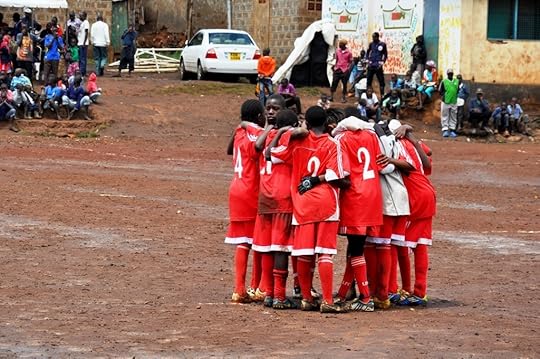
One of CFK’s soccer teams huddles together before their match.
Scheduling Carolina for Kibera’s final community-wide celebration of the year on World AIDS Day may seem like an odd choice. How could anyone feel celebratory on such a significant, serious day?
Every year on multiple occasions, “CFK Day” brings together community members—volunteers and non-volunteers alike—to learn, socialize, reflect, and have fun. Youth get the chance to connect in ways they hadn’t before, perhaps discovering talents or interests they didn’t know they possessed. Parents can see their kids show off those talents. Community members who are not involved with CFK have the opportunity to connect and perhaps receive life-changing care or services. And everyone gets to put their heart and their voice behind their favorite soccer team.

Participants in the Daughters United program performed a dance routine between soccer matches.
While “CFK Days” are indeed celebrations, they are also full of remembrance and reflection. They applaud how much progress has already been made, and anticipate the forward motion towards future health and opportunities.
But perhaps more importantly, they are community events. They bring people together, no matter what the circumstances.

Involving youth in soccer gives them the chance to build athletic skills and to grow closer by being a part of a team.
It’s one thing to be united by a terrible tragedy—and to be sure, the prevalence of HIV/AIDS globally, and in Kibera specifically, is tragic—but it is another to be united by a terribly tragedy that is also considered to be normal. In the U.S., HIV/AIDS is much less common (especially for heterosexual individuals) than in Kibera, where the HIV+ rate approaches 10%. In other words, it’s rare for someone living in Kibera to not have a friend or family member who lives with HIV.
Thus, HIV/AIDS often becomes common ground for members of the Kibera community. It is something to talk about at soccer matches, at dance performances, on the street, or over a meal, just as much as it is something to talk about at the doctor’s office.

In honor of World AIDS Day, Victrine, a counselor with CFK’s Sexual and Reproductive Health Program, gave people info about the importance of safe sex.
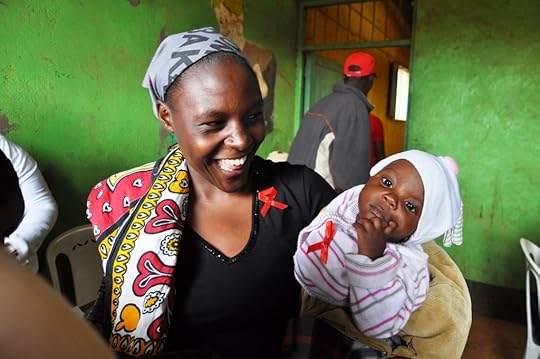
During the events, free HIV testing was offered for anyone interested. Getting tested regularly is vital in Kibera, where a lot of people are not sure of their HIV status.
This is not to trivialize the importance of combating the spread of HIV/AIDS. CFK volunteers and staff continuously educate and conduct outreach to community members about safe sex practices and the importance of reducing HIV transmission. Working towards eradicating HIV is crucial; celebrating and uniting as a community, often to talk about how to do that, is just as important.
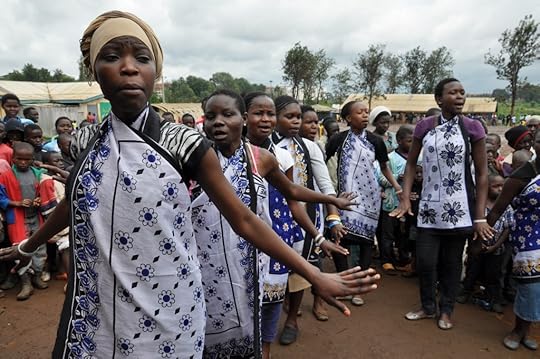
The Daughters United (Binti Pamoja in Swahili) program gives women and girls a space to express themselves freely.
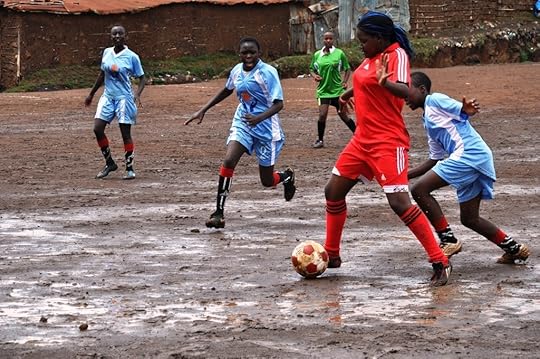
Despite rainy weather, the soccer tournament finals went smoothly, with both the boys’ and girls’ teams playing exciting matches.
CFK strives to develop leaders in several aspects of life: social, economical, and health. Lacking a firm foundation in any one of these three areas hinders growth and prevents holistic change.
Putting CFK Day and World AIDS Day together doesn’t seem so odd after all. Reflection often motivates change, and working towards change often motivates celebration, especially when the community has your back. Eliminating or even reducing HIV/AIDS in Kibera (or the world) takes a community effort, one that CFK Day hopes to foster through uniting people to celebrate lots of things: family, sports, health, each other, and the work they do together.
January 29, 2014
Isaac’s Ongoing Recovery from Malnutrition
One of the clearest markers of a community’s well-being is the health of its children. When resources like food, clean water, and income are scarce, surviving trumps thriving. Kids in Kibera who suffer from chronic malnutrition often never bounce back or reach the proper developmental milestones. However, if treated early enough, kids can be set on the right track.
We’d like to introduce you to Isaac.
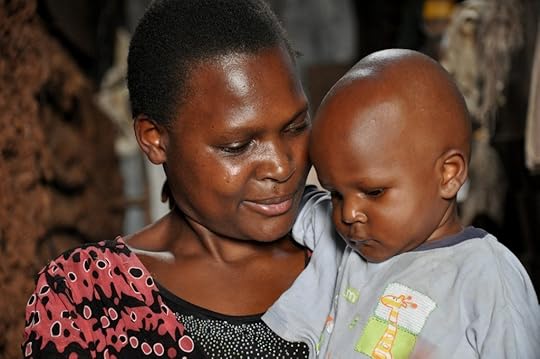
Isaac with his mother outside their home.
In May of this year, Isaac weighed 6 kgs (~13 lbs), at 13 months old. The normal weight of a child his age in Kenya is typically 8 kgs (~18 lbs). That’s not a big difference for an adult, but for an infant, it’s huge.
During a community screening for malnutrition, CFK Community Health Workers (CHWs) met Isaac and his parents. Isaac’s mother is a housewife who recently moved to Kibera from a rural area with her son to be with her husband, who works as a casual laborer. Making under $2 a day strained the family’s resources, and Isaac’s health showed it.
Isaac was so malnourished that instead of recommending him to enroll in CFK’s Lishe Bora Mtaani nutrition center right away, doctors at the Tabitha Medical Clinic recommended that Isaac go to the hospital for emergency care. Not only was Isaac severely malnourished, but he suffered from anemia, pneumonia, and developmental delays. Like many families in Kibera, Isaac’s parents were worried about being able to pay the hospital expenses, which were still costly despite the fact that children under 5 in Kenya can receive hospital care for a reduced price. But thanks to the support from CFK’s Health Department emergency fund, the bill of 4,800 shillings (~$56) was covered, and Isaac was released from the hospital weighing 6.7 kgs (~15 lbs).
After his hospital visits ended, Isaac was enrolled in the Lishe Bora nutrition center to continue receiving treatment in an out-patient setting. He was fed every two hours, with feeding supplements and balanced meals and snacks, and he participated in group activities with other infants to start building social skills.
The approach of Lishe Bora’s program involves parents of malnourished children as well. In order to ensure that Isaac would continue receiving proper nutrients,

Isaac’s family is visited by CFK staff members.
Isaac’s mother took classes on preparing balanced meals for her family and on the importance of good hygiene and sanitation for families living in Kibera.
After two months in the centre, Isaac was able to stand and walk on his own and was beginning to speak, all developmental milestones he previously hadn’t reached. He was finally released from the nutrition center at the standard weight of 18 lbs. Isaac’s mother believes that if it weren’t for CFK, she may have lost her son. Esther, CFK Nutritionist, believes, “This is what we do. We’re just doing our part for the health of the kids.”
Because staying healthy is an ongoing process, Esther and other nutrition center staff visit Isaac and his family on a weekly basis to make sure that Isaac continues his progress. Though the family still struggles economically, they now better understand the importance of making healthy choices through nutritious food and personal hygiene, a lesson that will help keep them and their children safe.
Rye Barcott's Blog
- Rye Barcott's profile
- 7 followers








